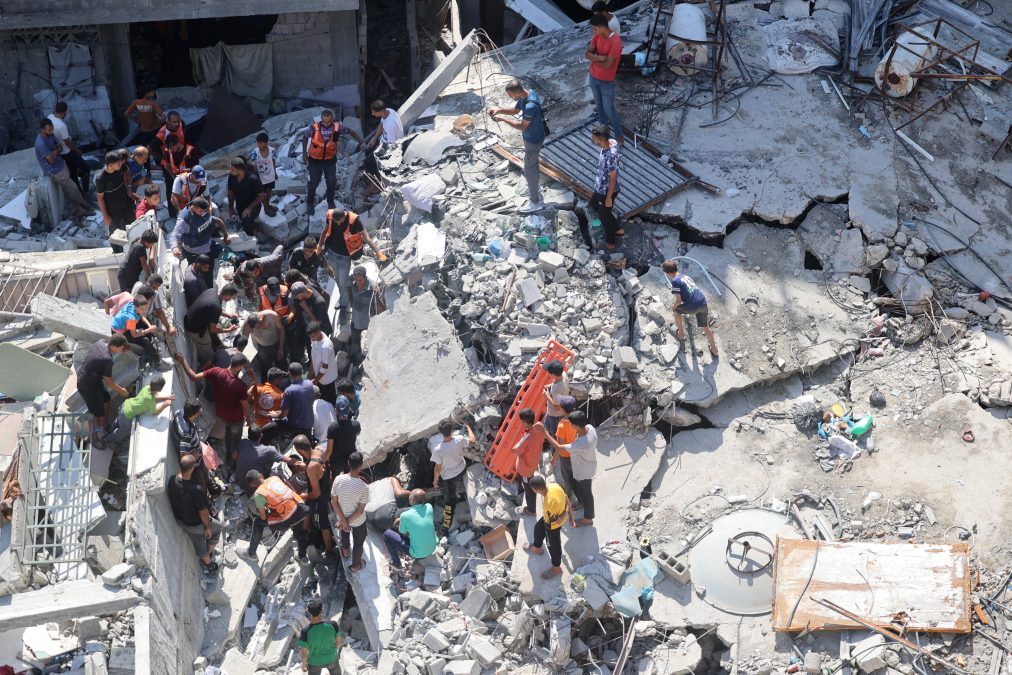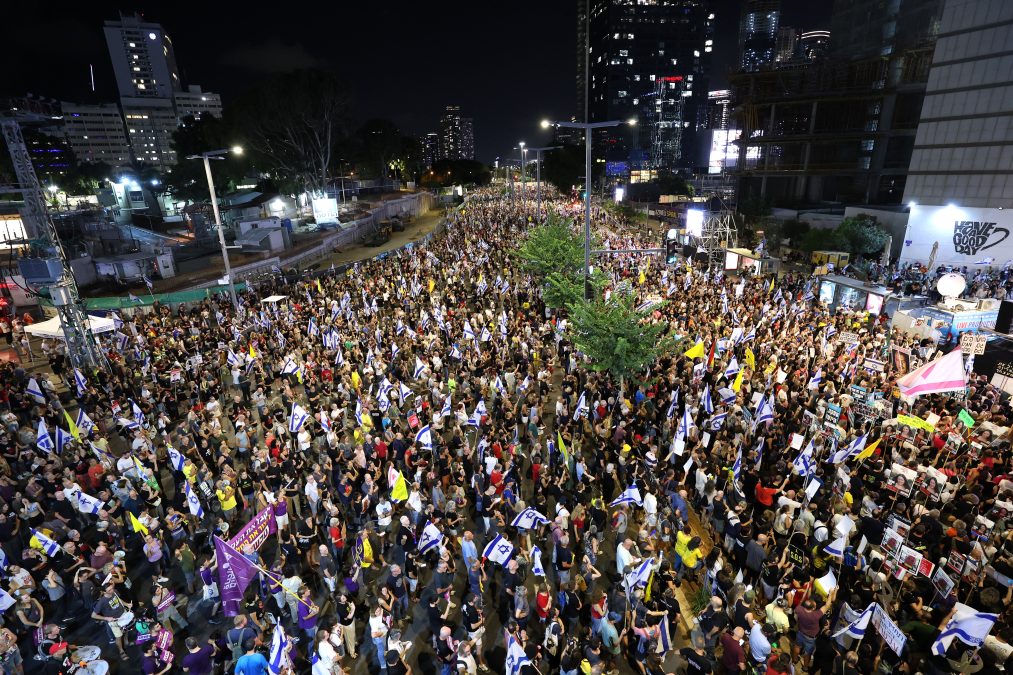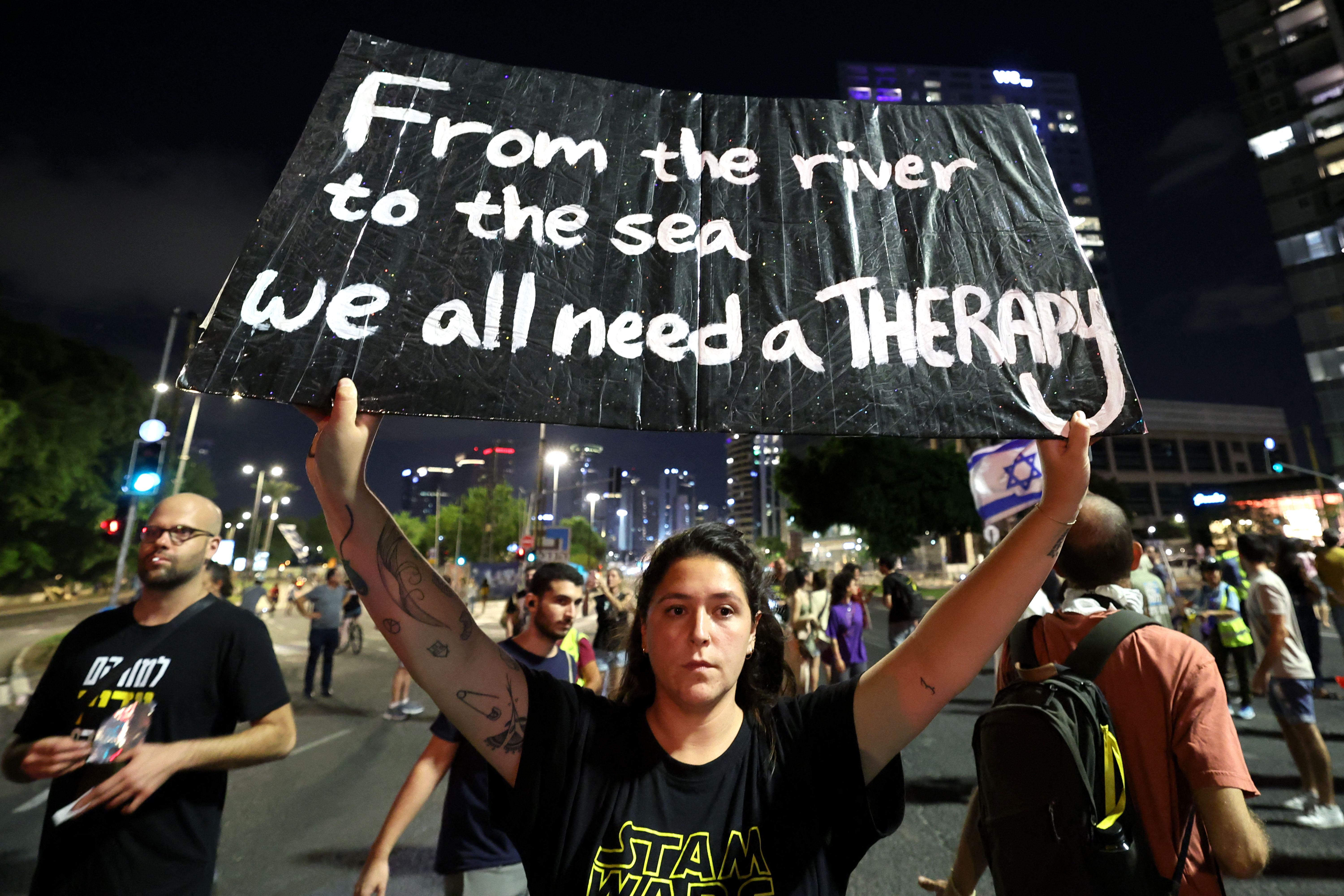Gaza/Tel Aviv — The sheer scale of destruction from the deadliest war in Gaza’s history has made the road to recovery difficult to imagine, especially for people who had already lost their homes during previous conflicts. Also, 11 months of war in Gaza has battered Israel’s economy, and poverty is now threatening communities including in areas far removed from the fighting against Hamas.
After an Israeli strike leveled his family home in Gaza City in 2014, 37-year-old Mohammed Abu Sharia made good on his pledge to return to the same plot within less than a year.
The process was not perfect: the grant they received paid for only two floors instead of the original four.
But they happily called it home until it came under aerial assault again last October, following Hamas’s attack on southern Israel.
This time, the family could not flee in time and five people were killed, four of them children.
The rest remain displaced nearly a year later, scattered across Gaza and in neighboring Egypt.
“A person puts all his life’s hard work into building a house, and suddenly it becomes a mirage,” Abu Sharia told AFP.
“If the war stops, we will build again in the same place because we have nothing else.”
IT’S RAINING BOMBS!
With bombs still raining down on Gaza, many of the Palestinian territory’s 2.4 million people will face the same challenge as Abu Sharia: how to summon the resources and energy necessary for another round of rebuilding.
“The pessimism is coming from bad experiences with reconstruction in the past, and the different scale of this current destruction,” said Ghassan Khatib, a former planning minister.
That has not stopped people from trying to plan ahead.
Some focus on the immediate challenges of removing rubble and getting their children back in school after nearly a year of suspended classes.
Others dream of loftier projects: building a port, a Palestinian film industry, or even recruiting a globally competitive football team.
But with no ceasefire in sight, analysts say most long-term planning is premature.
“It’s sort of like putting icing on a cake that’s not yet fully baked,” said Brian Katulis of the Middle East Institute in Washington.
DECADES TO REBUILD
It could take 80 years to rebuild some 79,000 destroyed homes, the United Nations special rapporteur on the right to housing said in May.
A UN report in July said workers could need 15 years just to clear the rubble.
The slow responses to past Gaza wars in 2008-9, 2012, 2014, and 2021 give little reason for confidence that rebounding from this one will be any smoother, said Omar Shaban, founder of the Gaza-based think tank PalThink for Strategic Studies.

Regional governments have in the past pledged large sums but then failed to disburse them.
The Israeli blockade of Gaza, imposed after Hamas took control of the territory in 2007, remains firmly in place, sharply restricting access to building materials.
“People are fed up,” Shaban said.
“They lost their faith even before the war.”
INNOVATIVE STRATEGIES
Despite the hopelessness, Shaban is among those putting forward more imaginative strategies for Gaza’s postwar future.
Earlier this year he published an article suggesting initial reconstruction work could focus on 10 neighborhoods — one inside and one outside refugee camps in each of Gaza’s five governorates.
The idea would be to ensure the benefits of reconstruction are seen across the besieged territory, he told AFP.
“I want to create hope. People need to realize that their suffering is going to end” even if not right away, he said.
“Otherwise they will become radical.”
Hope is also a major theme of Palestine Emerging, an initiative that has suggested building a port on an artificial island made of war debris, a technical university for reconstruction, and a Gaza-West Bank transportation corridor.
Other proposals have included launching a tourism campaign, building a Palestinian film industry, and recruiting a football squad modeled on the strategies of Qatar and Saudi Arabia.
“Maybe when you look at some of these, you would think they are, you know, dreams or something,” Palestine Emerging executive director Shireen Shelleh said from her office in Ramallah in the Israeli-occupied West Bank.
“However, I believe if you don’t dream then you cannot achieve anything. So even if some people might find it ambitious or whatever, in my opinion, that’s a good thing.”
Khatib, the former planning minister, said it was not the time for such proposals.
“I think people should be more realistic,” he said.
“The urgent aspects are medicine, food, shelter, schools.”
NETANYAHU DYNAMICS
Mass protests against Prime Minister Benjamin Netanyahu’s controversial judicial reforms had already weakened Israel’s economy before the Hamas attack on October 7.
But it was dealt a major blow by the impact of the worst attack in its history, and the war that has followed.
“The Israeli economy may be solid, but it is struggling to withstand this war that has lasted too long,” said economist Jacques Bendelac, who warned of possible recession should fighting persist.
After shrinking by 21 percent in the fourth quarter of 2023, Israeli GDP rebounded by 14 percent in the first three months of 2024, according to official data.
But growth then turned sluggish in the second quarter at 0.7 percent.
The three main ratings agencies have downgraded Israel’s debt.
Fitch predicted in August that the Gaza war — already the longest since the war that led to Israel’s creation — could stretch into 2025.
“There are risks of it broadening to other fronts,” Fitch said.
The focus of the war has in recent days shifted to northern Israel, with Hamas ally Hezbollah battling Israeli forces across the border.
Israel’s credit ratings remain high, but top officials have nevertheless blasted the agencies’ moves.
Netanyahu has insisted that the economy is “stable and solid” and will improve when the war ends.
IS WAR A BOON OR BUST?
Israel’s two main growth drivers are tech, which is relatively insulated from the war, and weapons, for which the war is a boon.
But the remaining economic engines of tourism, construction, and agriculture “are dying out one after the other”, said Bendelac, professor emeritus at the Hebrew University of Jerusalem.
Israel stopped issuing work permits for Palestinians after the October 7 attack, creating damaging labor shortages, according to Kav LaOved, an Israeli labor rights organization.
Before the war, some 100,000 such permits boosted manpower in the construction, agriculture, and industrial sectors, with tens of thousands of Palestinians also working illegally inside Israel.
Kav LaOved says only 8,000 Palestinian workers have been exempted from the entry ban to work in factories deemed essential.

In the economic hub Tel Aviv, construction work is on pause, with skyscrapers and transport projects left half-finished.
Tourism has also plummeted since October 7, with the war driving away holidaymakers and religious pilgrims.
From January to July, Israel welcomed 500,000 tourists — a quarter of the number for the same period the previous year, the tourism ministry said.
With no clients, 47-year-old Hilik Wald gave up his job as a freelance guide in Jerusalem, which had earned him an average of 18,000 Israeli shekels ($4,755) monthly.
He now works part-time on the information desk of a train station.
For nearly six months, the father of two received government assistance to supplement his wage, but he is no longer eligible.
“I hope the war will be over soon,” said Wald.
TRAPPED UNDER LOANS
Over the past two decades, Israel grew “on credit consumption, and in crisis situations many families can no longer repay their loans”, according to Bendelac.
High living costs combined with an economic slowdown will “inevitably result in an increase in poverty”, he said.
Humanitarian organizations in Israel are already reporting a greater need for their services, with new faces appearing in food distribution queues.
At a shopping center parking lot in Rishon Lezion, a coastal city in central Israel, the NGO Pitchon-Lev, or “Open Heart”, offers free baskets of fruit, vegetables and meat twice a week.
Since the war began “we have more than doubled our activities”, said founder Eli Cohen, noting that the organization supports nearly 200,000 families nationwide.
New beneficiaries include “young people, families whose husbands are reservists, many people who were former donors and all those who were evacuated from their homes”, Cohen said of those displaced by border clashes between Israel and Lebanon-based Hezbollah.
As for recovery prospects, Bendelac said “there is always a very strong restart of the economy” whenever war ends.
But, he added, “the longer this war lasts, the slower and more difficult the restart will be”.








